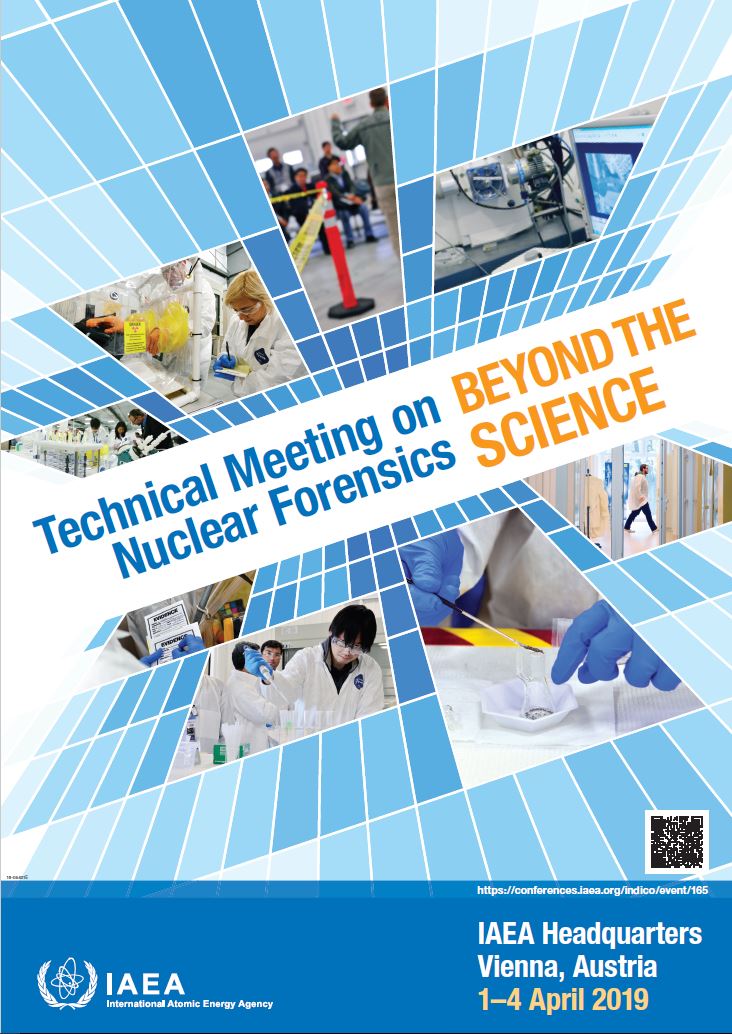 Background
Background
The IAEA Division of Nuclear Security will convene a Technical Meeting on nuclear forensics from 1 to 4 April 2019, at the IAEA Headquarters in Vienna. This meeting will focus on the implementation of nuclear forensics in response to nuclear security events involving nuclear and other radioactive material out of regulatory control. With attention to human capacity building and the utilization of existing technical capabilities, the meeting will feature shared experiences in the development and sustainability of nuclear forensics as well as the conduct of a nuclear forensic examination. The meeting will also feature recent advancements in nuclear forensic science including research promoting confidence in findings and subsequently presenting the findings within a court of law. The meeting seeks to highlight the current state of practice, capabilities and technical assistance in nuclear forensics in the context of national laws and international legal instruments related to nuclear security.
Objectives
The objective of the Technical Meeting is to provide a forum for IAEA Member States, which are considering or are currently establishing nuclear forensic capabilities, to focus on the application of nuclear forensic science in responding to incidents involving nuclear and other radioactive materials out of regulatory control. The meeting includes links to the theme of radiological crime scene management in the context of national laws and international legal instruments.
Furthermore, the programme for the meeting will address recent statements of General Conference Resolutions supporting the further development of nuclear forensics among Member States. The meeting will incorporate outcomes of the 2014 IAEA International Conference on Nuclear Forensics. Accordingly, the conclusions from the 2019 meeting will inform the next ministerial level IAEA International Conference on Nuclear Security, which will take place in 2020.
An IAEA TECDOC will be published with the findings from the meeting to include extended abstracts, summary reports of each technical session, as well as a roadmap of the subsequent IAEA's programme of assistance to States in nuclear forensics.
Target Audience
Participants at the meeting will comprise nuclear and forensic scientists, nuclear security event responders, law enforcement officials, prosecutors, nuclear regulators, nuclear security specialists and those supporting the development and implementation of a country’s national response plan for nuclear security events. The nominated participants should have responsibility for planning, developing or implementing their respective countries’ national response plans for nuclear security events, or be in a position to develop and sustain nuclear forensic capabilities within their respective organizations.
The IAEA welcomes and encourages the participation of women and individuals from developing countries.
Programme Structure
The Technical Meeting programme will consist of an opening session, plenary sessions, technical sessions, poster presentations, interactive content sessions, and a closing session. The opening session will include welcoming addresses by representatives of the IAEA and cooperating organizations. The plenary sessions will continue with a combination of invited keynote presentations and contributed presentations addressing the main themes of the meeting. Each technical session will include selected presentations and/or panel discussions delivered by participants and based on the extended abstracts submitted. The meeting will also include poster and interactive content sessions, with sufficient time for face-to-face discussions and interaction with colleagues. The final plenary session will be dedicated to technical and scientific findings and investigative conclusions that inform future IAEA planning.
The agenda will be structured with a balance of invited Member States' presentations, panel discussions and poster presentations.
Recognising the importance of international collaboration in nuclear forensics, the IAEA cooperates with nuclear forensic partners, including the Nuclear Forensics International Technical Working Group (ITWG), the Global Initiative to Combat Nuclear Terrorism (GICNT) and the International Police Organisation (INTERPOL), all of which are expected to take part in the meeting.
Language
The working language of the meeting is English; no interpretation will be provided.
Registration and Funds
No registration fee is charged to participants.
The IAEA is generally not in a position to bear the travel and other costs of participants in the Technical Meeting. The IAEA has, however, limited funds at its disposal to help meet the cost of attendance of certain participants. Such assistance may be offered upon specific request to normally one or more participants per country provided that, in the IAEA’s view, the participant(s) will make an important contribution to the Technical Meeting. The application for financial support should be made at the time of designating the participant(s). If Governments wish to apply for a grant on behalf of one of their experts, they should address specific requests to the IAEA to this effect. Governments should ensure that applications for grants are submitted by 31 December 2018 using the Grant Application Form (Form C). Approved grants will be issued in the form of a lump sum payment that usually covers only part of the cost of attendance.
Key Dates
- 31 December 2018: Submission of 2-page extended abstracts through INDICO
- 31 December 2018: Submission of Participation Form A through a competent national authority – see Section E of the Announcement
- 31 December 2018: Submission of Grant Application Form C through a competent national authority – see Section F of the Announcement
- 31 January 2019: Notification of acceptance of extended abstracts
- 18 March 2019: Deadline for presentations and posters
- 1 April 2019: Meeting begins
